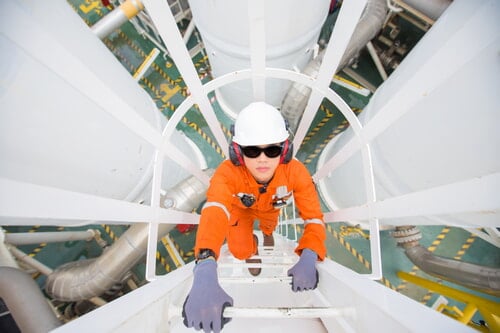Personal Protective Equipment

PPE / Safety Gear Needed for Oil and Gas Refinery Turnarounds
Sometimes, oil and gas refineries have to shut down for maintenance, renewing equipment, repairs, and upgrades. The shutdown period is called a turnaround. A turnaround can be done on one machine or the entire refinery. Some major turnarounds take more than a year to plan. During a turnaround, whether planned or unplanned, such as in the case of mechanical failures, the site often has many more employees; it could go from around 800 employees to over 3,000 employees and contractors.
Most refineries have a safety readiness plan for turnarounds in place. These safety plans must be in place at all times since a malfunction could cause the refinery to shut down at any time. Thus, refineries must keep personal protective equipment (PPE) for all the extra people stocked.
A Turnaround Schedule
A planned turnaround has several phases, including:
- Prepare for the turnaround.
- Shut down the equipment being worked on or the refinery.
- Perform maintenance, upgrades and repairs.
- Start the refinery up again.
- Post-turnaround work.
Every phase has different health risks and challenges for employees and contractors. Someone might have to work with chemicals, while another person might have to weld something to repair it. Other activities often performed during a turnaround include catalyst removal, abrasive blasting, insulation removal, cutting and / or welding, tank cleaning, pipe draining, and repairs to machinery.
Turnaround Hazards and the Personal Protective Equipment Required
During a turnaround, workers need different types of PPE, depending on their jobs. Abolox carries gloves, coveralls, jeans, shirts, flame-resistant clothing, hi-vis clothing and more. Personal protective equipment significantly minimizes the risk of injury during a turnaround.
- Hydroblasting: This process uses a lot of chemicals, including hydrogen sulfide and arsenic. It also creates polluted water. The PPE required for hydroblasting includes a clear face shield, steel-toed boots, waterproof gloves with a sticky surface and a rain suit made of nylon fabric or that has a neoprene coating.
- Explosions and fires: When working with gas, oil and chemicals, fires and explosions can easily happen. Workers should be prepared at all times for the risk of explosions and fires. Abolox carries flame-resistant arc gear, flame-resistant rain gear and protective eyewear that minimizes the risk of extensive burns.
- Airborne particulate matter and dust: It’s almost always dusty at refineries. Many workers need eye protection for other reasons. Instead of having more than one type, they can choose safety goggles that are impact-resistant or safety glasses with eye shields.
- Noise. When the machines are running in a refinery, the noise can be overwhelming. Even when you get used to the noise, it could cause ear injuries such as deafness and ringing in the ears. Abolox carries ear protection to minimize the risk of ear injuries.
- Welding and cutting: Nearly all refineries use welders and cutters to install and repair equipment, pipelines, girders, welding platforms and beams. PPE for welders includes eye protection, welding gloves and gloves with cut protection.
- Falling objects: If something drops from above you, it could land on your head and cause significant injury. PPE that protects you against dropped and falling objects include lanyards for tools, belts, holsters, pouches, hard hats and steel-toed boots.
- Crush injuries: Getting caught between objects or hitting your hands are common at refineries. PPE to protect against crush injuries include hard hats, steel-toed boots, and impact-resistant gloves.
- Transportation tasks: Working with metal pipes, machines, and other items in a refinery can often damage workers’ hands. Abrasion-resistant gloves protect your hands from abrasive injuries.
- Cuts and lacerations: Working with metal and tools makes the risk of cuts and lacerations high. Using cut-resistant gloves prevents many cut injuries.
- Handling chemicals, oil and liquids: Refineries have the obvious liquids of oil and gas. Workers also handle other liquids and chemicals, including additives, solvents, acids, corrosives, ammonia, benzene, hydrogen fluoride, hydrogen sulfide and wastewater. Abolox carries waterproof gloves to protect your hands against these chemicals. Other PPE required includes impact-resistant chemical gear and protective goggles.
Contact Abolox for Personal Protective Equipment
If you work at or manage an oil and gas refinery, visit Abolox for the personal protective equipment you need to protect yourself and your workers. If you don’t see what you need, call the store, and we’ll source it for you.